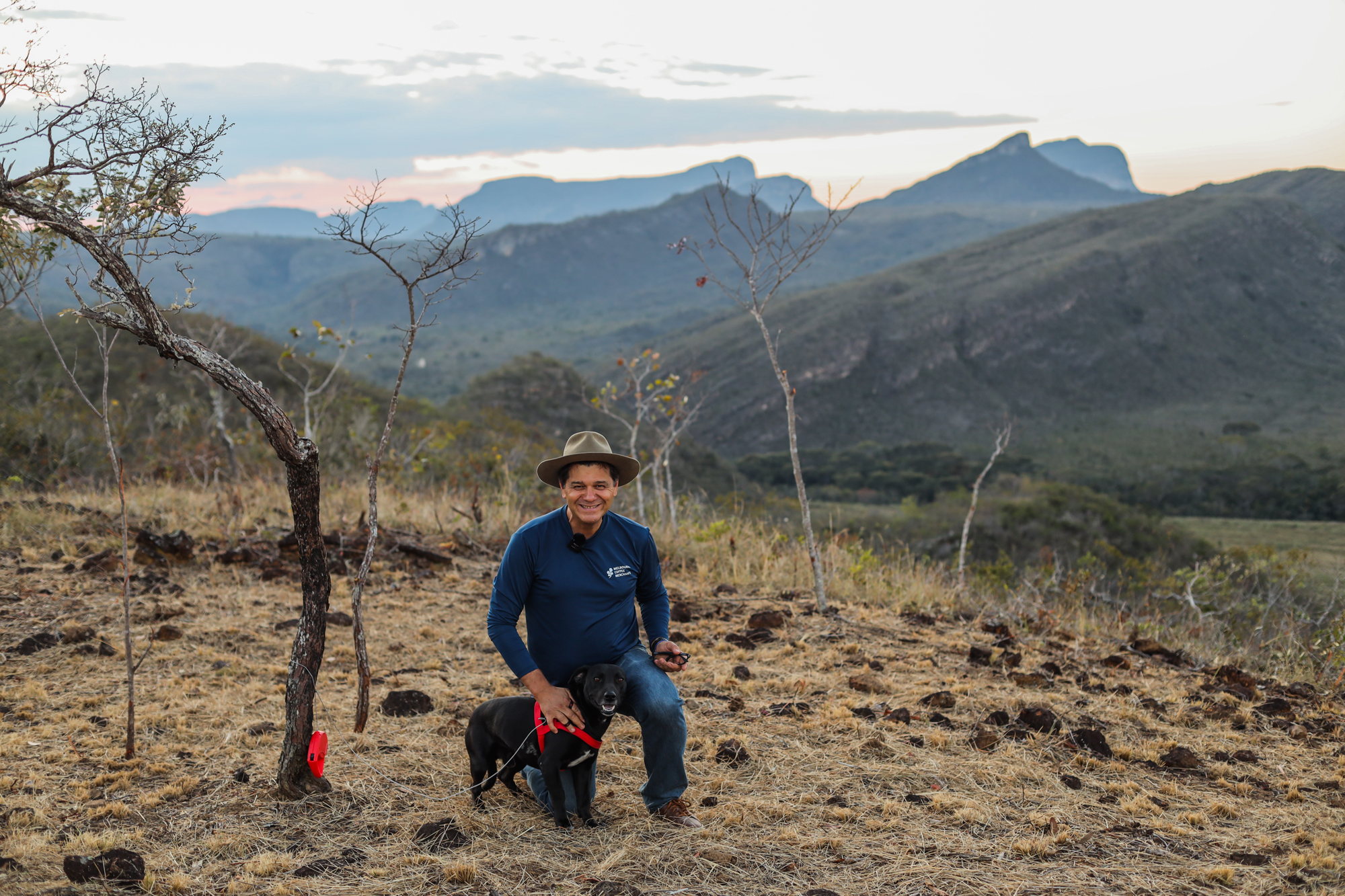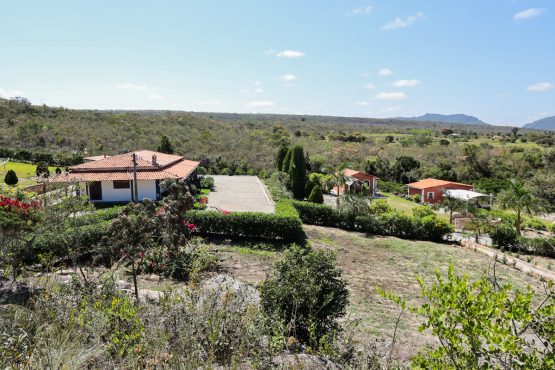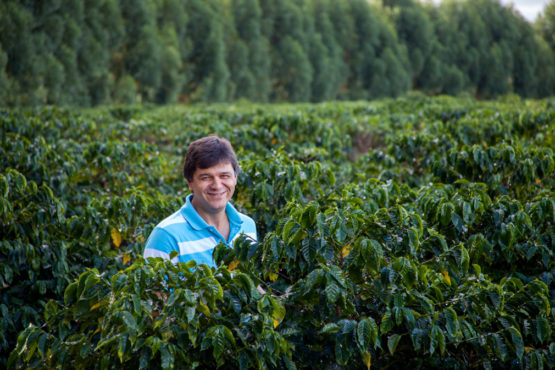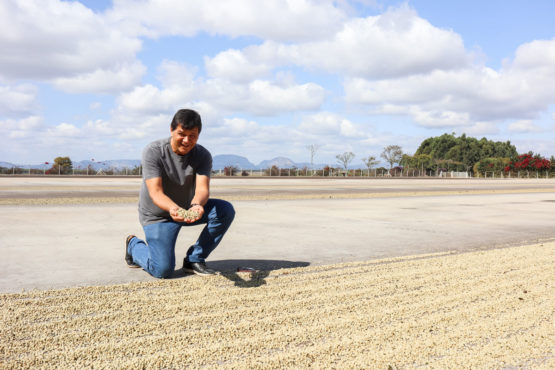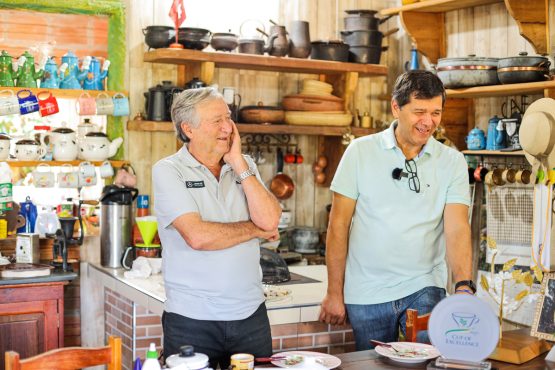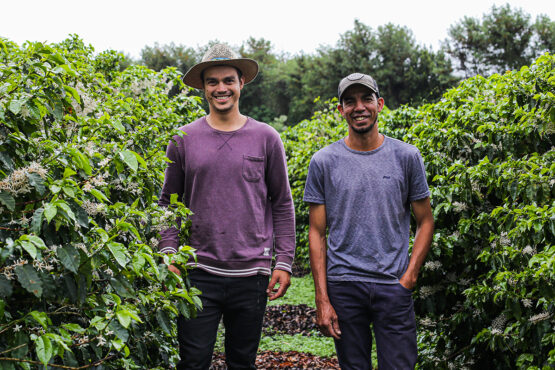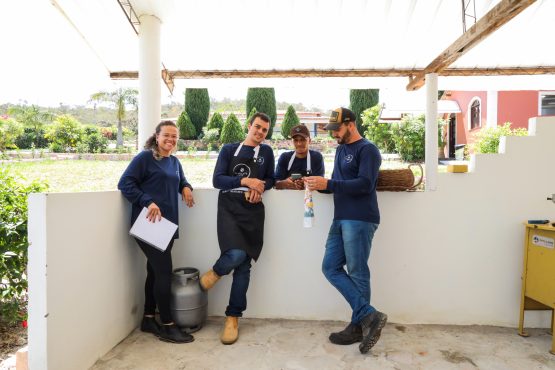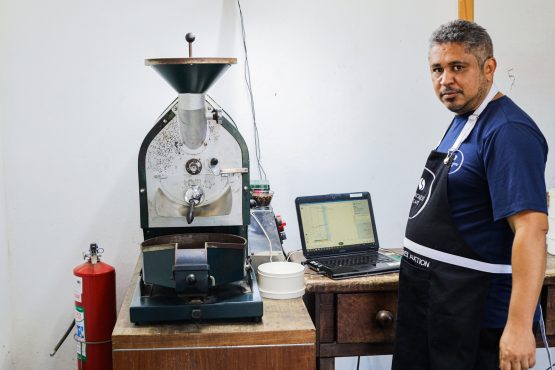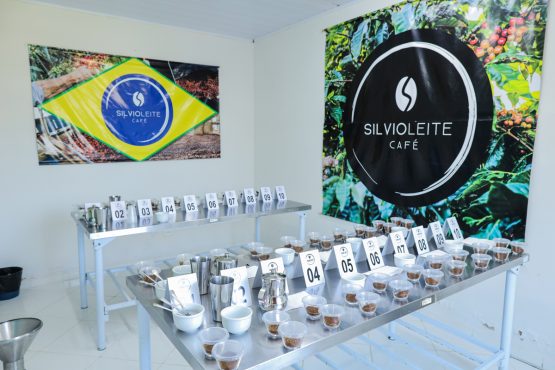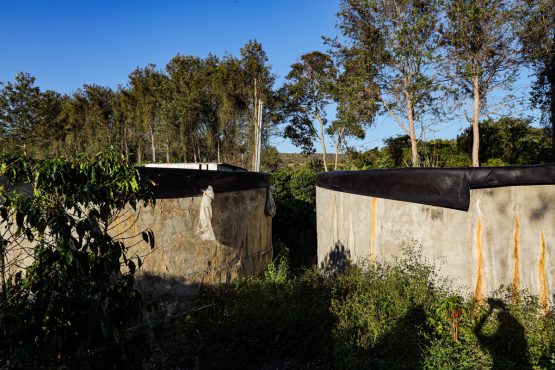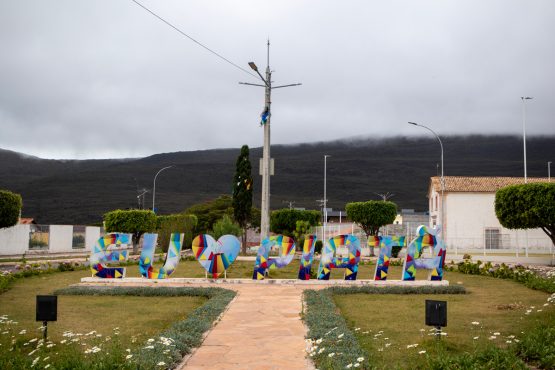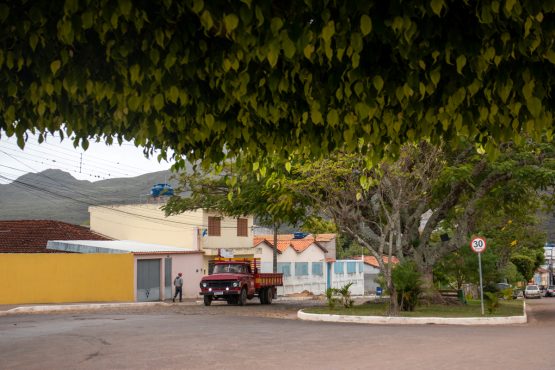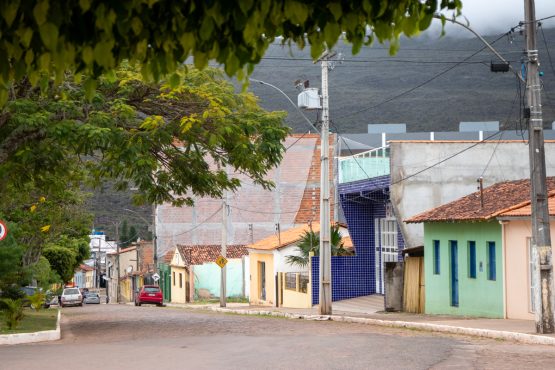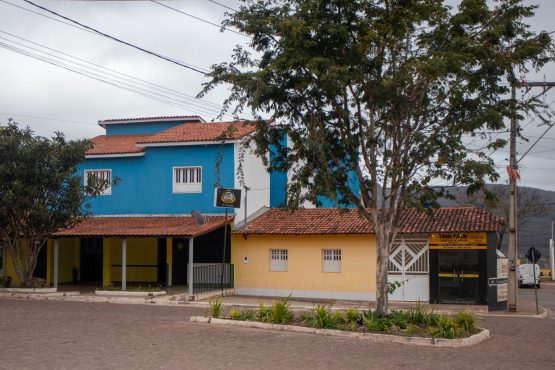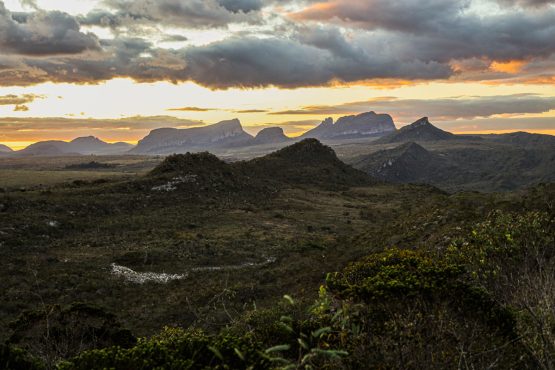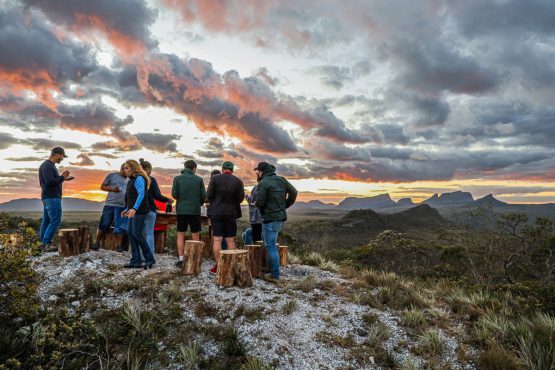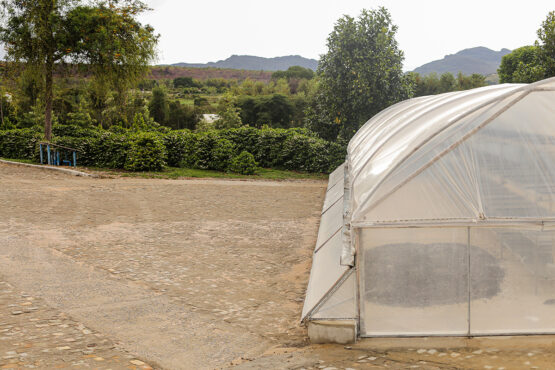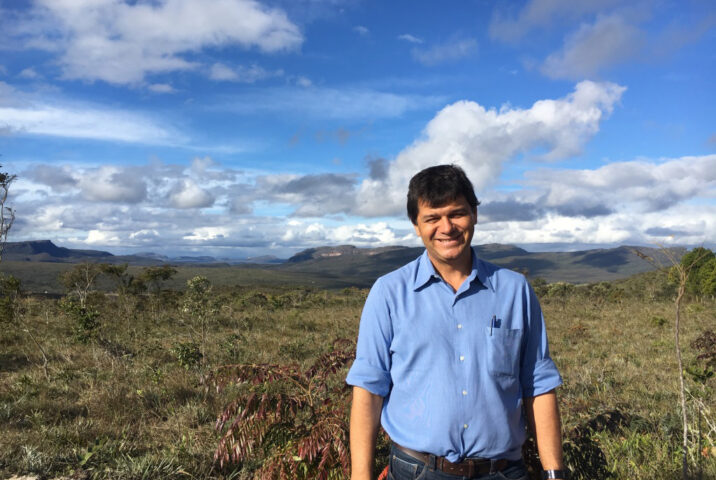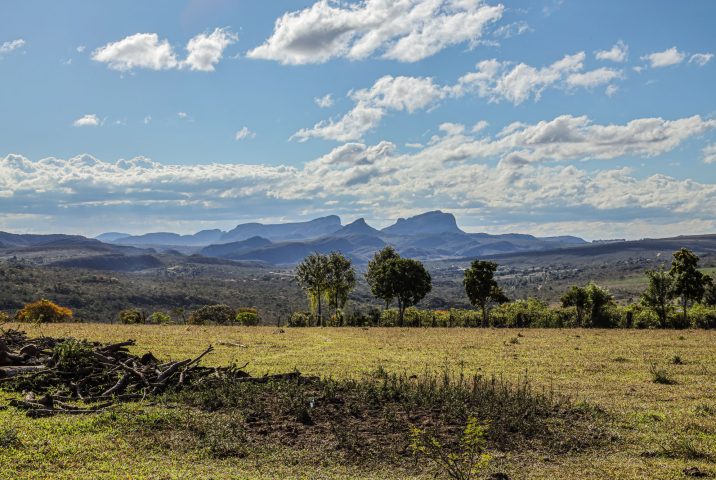Cerca de Pedras São Benedito Natural
Distinct and complex, with winey acidity and lingering florals. Blueberry, custard apple and golden syrup.
This coffee was processed by our dear friend, coffee mentor and sourcing partner in Brazil, Silvio Leite, at his farm Cerca de Pedras. For the lot, Silvio used coffee cherry grown by one of his neighbours, Arnóbio Araújo, at his farm Nossa Senhora Aparecida. Both estates are located in Piatã, a unique coffee growing region in Bahia’s Chapada Diamantina region. Chapada Diamantina translates to ”Diamond Plateau” in Portuguese and for 100 years this area was mined for the gemstones embedded in its cliffs. Today, the region is famous for its specialty coffee.
We have worked with Silvio for many years to source the very best coffees that Brazil has to offer, however, we have only recently been able to procure coffee grown and processed by Silvio himself. During decades of developing and pushing the Brazilian coffee industry forward Silvio dreamt of producing his own coffees, a long-held goal he achieved in 2021 with the establishment of Cerca de Pedras estate, just outside of Piatã town. Having built a stellar reputation as an exceptional cupper and astute trader, Silvio’s goal is now to make a name for himself as a coffee producer too. We’re thrilled to share his coffee with the Australian roasting community.
“This farm comes as a fulfilment of a dream. Having been in the coffee business for over 40 years, the dream of producing my own coffee comes true now with Fazenda Cerca de Pedra Sao Benedito, and my first harvest.” – Silvio Leite, 2021
Silvio purchased this 30-hectare farm in 2019 and divided the land into four different coffee plots: São Benedito, Pasagem Pedras, Sakura and Beira Rio. São Benedito sits at 1,230m above sea level and was the first plot to be planted at the estate. The 6.5-hectare plot is fully shaded and planted with seven varieties: Pacamara, SL28, Aramosa, Catucai, Catuaí, Bourbon and a small amount of Gesha. The varieties were selected by Silvio after trials at São Benedito where they proved to be high yielding and to produce a high cup quality in the estate’s unique growing conditions. Silvio considers the introduction of any new varieties to Cerca de Pedras carefully, to avoid disrupting the balance in place.
To ensure the estate’s success, Silvio has worked with an all-star team to establish Cerca de Pedras’ four plots — Antônio Rigno (of the multi-award-winning São Judas Tadeu) is acting as Silvio’s advisor, Kleumon Silva Moreira (owner of Sitio Canaã) is the manager of the farm, and further assistance is provided by Wedson Marques de Souza, whose farm placed 4th in 2021’s Cup of Excellence competition. Silvio has worked as an advisor and business partner with these producers for many years, and there a great deal of trust and mutual respect between them. A total of 12 staff are employed at Cerca de Pedras full-time, with an additional 25 seasonal workers coming on board during the harvest.
When asked about the future of Cerca de Pedras, Silvio explains that his goal is to use the estate as “…A model… a coffee school to showcase how to sustainably produce specialty coffee. With the help of an agronomist, we are sharing this knowledge with many small producers in the region who may not have the resources to afford external consultation and advice.”
Today, Cerca de Pedras serves as Silvio’s centre of operations in Piatã. The estate’s beautiful homestead is Silvio’s residence during the harvest and when he visits the region, and all evaluations are done at his cupping lab on site. Led by Kleumon Moreira of Sitio Canaã, Silvio’s team assist with the roasting and cupping, as well as with the day-to-day operations of the property. At the wet mill, Kleumon also manages processing for harvested cherries, including some experimentation with controlled fermentation and drying practices. The goal is to produce sweet and clean coffees with a refined acidity and a distinct taste of place. The facilities are also made available to other producers, like Kleumon himself, and serve as a model for local producers to learn techniques that will improve their crop.
Most of the water for irrigation comes from the local De Contas river, which runs through the São Benedito plot. Permits are required to access the waterway, and all usage must be closely monitored. In recent years, Silvio has invested in building a water reserve which sits at a higher elevation than his coffee trees, so that water can be distributed via gravity, rather than requiring the costly installation of a pump. The water reserve is connected to a drip irrigation system, which consists of a series of perforated pipes running beneath the trees to deliver water directly to their roots.
By demonstrating the benefits of such a system to neighbouring producers, Silvio hopes that some may be inspired to build their own reserves to stay ahead of the impending challenges of climate change and ensure their production doesn’t suffer during dry years. Silvio has also hired a consulting agronomist to analyse the health of each plot’s soil every year, with the goal of determining the best fertiliser to use during irrigation.
Head here to learn more about Silvio and the incredible work he’s done in Brazil.
ABOUT PIATÃ
Located at the foot of the Chapada Diamantina mountain range, Piatã is a unique growing region in Brazil’s Bahia state. The coffees produced here tend to be floral, sweet and complex, and noticeably distinct from those grown elsewhere in Brazil. There are two main factors behind this: coffee grows at elevations of up to 1,400 meters above sea level, which is high for the country; and temperatures range from about 2°C to 18°C in winter, some of the lowest in Brazil. Combined, the high elevation and cool climate are key in slowing down the maturation of the coffee cherries, leading to an increased concentration of sugars in the bean. The result is a cup profile that is bright, transparent, and distinctive. Piatã’s relative proximity to the Equator line ensures the region’s coffee trees can experience such drastic conditions without being affected by frost, unlike other, more traditional coffee-growing regions in the country.
Piatã’s exceptional natural characteristics also contribute greatly to the coffees’ profile. In the distant past, the whole of Chapada Diamantina was completely under water, slowly eroding over millions of years — leaving behind soil that is nutrient-rich and slightly soft. This soil, along with the above-average local humidity, is home to a healthy and diverse ecosystem that includes some 1,600 individual plant species. While the highlands of Chapada are rugged and dry, the area surrounding Piatã is filled with streams, waterfalls and even swamps that, in most years, provide plenty of water for irrigation and agriculture.
While coffee production is on the rise in Piatã, it is still very much a developing industry. Locally produced lots didn’t gain recognition for quality among Brazilian buyers until the 1990s. This recognition led to the establishing of the ASCAMP growers’ association in 1998, which was tasked with assisting growers who had land, but few resources. Over the next decade, cooperatives and other farmer groups were founded, playing a pivotal role in elevating the coffees grown and processed in the region. Piatã went on to be internationally recognised for its high quality in 2009, when five of the top 10 spots in Brazil’s Cup of Excellence came from this small corner of Bahia. The region’s dominance in the competition has continued every year since, particularly in 2016 when an astounding 19 of the 24 winning lots came from Piatã, and again in 2022, when 10 local winners were recognised! MCM has been sourcing coffee from this region since 2012, thanks to the support of longtime partner and coffee mentor Silvio Leite. Head here for more on Silvio and the incredible work he’s done in Brazil.
Part of what makes the Piatã region so special is that production is extremely limited, given the scale of the local estates. Farm sizes tend to be relatively small when compared to other producing areas in Brazil, usually just ten hectares or less in size, and are not visible when driving through the outskirts of town (unlike somewhere like Cerrado de Minas in Minas Gerais, where large estates make up most of the landscape). Most growers process their own cherry on site, sticking to traditional methods with little focus on experimentation, with the goal of processing coffee well and ensuring the final cup is sweet and clean. As many producers rely on coffee as their main source of income, simplicity and repeatability are prioritised. Great attention to detail is placed on the post-harvest work, as the region’s cooler temperatures and high humidity pose risks to the drying parchment. To prevent any potential defects in the cup, many local producers have built greenhouses and raised beds, to add a layer of protection without minimising the necessary ventilation for coffee to dry evenly and at a steady rate.
The region of Piatã is the traditional home of the Cariri and Maracá indigenous people, who were defeated during the Portuguese invasion of Brazil in the seventeenth century. While most of the remaining Cariri people were displaced to other regions within the state of Bahia, eventually joining other indigenous communities, the Maracás have a nearby municipality located at their historical capital city, named in their honour. The word “piatã” translates to “hard foot or fortress” in the indigenous Tupi language (which was spoken by most First Nations People along Brazil’s coast). Head here to learn more about beautiful Piatã.
HOW THIS COFFEE WAS PROCESSED
At Arnóbio Araújo’s Nossa Senhora Aparecida, cherries were carefully harvested by hand across multiple passes, once they have hit peak ripeness. The work is done mostly by local women (called “panhadeiras de cafe”) who are extremely disciplined and ensure only the very best cherries are selected.
This coffee was then taken to Cerca de Pedras to be naturally processed. Cherries were washed gently and carefully laid out in greenhouses to dry on raised beds. During drying, the cherries were turned several times a day to ensure they were drying evenly. At this stage, the coffee is primarily left in the shade, which slows down and extends the drying considerably. Silvio tells us this is key in improving and ‘saving’ the fructose and all positive attributes found in the fruit, which will contribute to a higher quality in the final cup. Finally, the beans were separated into numbered lots, and later stored and rested in parchment in a purpose-built warehouse. They were then cupped for quality control prior to export.
